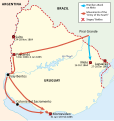Portal:Uruguay
| Portal | Participants | Templates | Tasks | Assessment | Popular Pages | Requests |
The Uruguay Portal
Uruguay (/ˈjʊərəɡwaɪ/ ⓘ YOOR-ə-gwy, Spanish: [uɾuˈɣwaj] ⓘ), officially the Oriental Republic of Uruguay (Spanish: República Oriental del Uruguay), is a country in South America. It shares borders with Argentina to its west and southwest and Brazil to its north and northeast, while bordering the Río de la Plata to the south and the Atlantic Ocean to the southeast. It is part of the Southern Cone region of South America. Uruguay covers an area of approximately 176,215 square kilometres (68,037 sq mi). It has a population of around 3.4 million people, of whom nearly 2 million live in the metropolitan area of its capital and largest city, Montevideo. The area that became Uruguay was first inhabited by groups of hunter-gatherers 13,000 years ago. The predominant tribe at the moment of the arrival of Europeans was the Charrúa people. At the same time, there were also other tribes, such as the Guaraní and the Chaná, when the Portuguese first established Colonia do Sacramento in 1680; Uruguay was colonized by Europeans later than its neighboring countries. The Spanish founded Montevideo as a military stronghold in the early 18th century due to competing claims over the region, while Uruguay won its independence between 1811 and 1828, following a four-way struggle between Portugal and Spain, and later Argentina and Brazil. It remained subject to foreign influence and intervention throughout the first half of the 19th century. From the late 19th century to the early 20th century, numerous pioneering economic, labor, and social reforms were implemented, which led to the creation of a highly developed welfare state, which is why the country began to be known as "Switzerland of the Americas". However, a series of economic crises and the fight against far-left urban guerrilla warfare in the late 1960s and early 1970s culminated in the 1973 coup d'état, which established a civic-military dictatorship until 1985. Uruguay is today a democratic constitutional republic, with a president who serves as both head of state and head of government. In 2023, Uruguay was categorized as being a "full democracy" in the The Economist Democracy Index, and is highly ranked in international measurements of government transparency, economic freedom, social progress, income equality, per capita income, innovation, and infrastructure. The country has fully legalized cannabis (the first country in the world to do so), as well as same-sex marriage and abortion. It is a founding member of the United Nations, OAS, and Mercosur. (Full article...) Selected article -Alas Uruguay (Spanish for Wings Uruguay) was an airline from Uruguay. It was founded by former employees of the defunct Uruguayan flag carrier, PLUNA, which closed in 2012. PLUNA had been a state-owned enterprise most of its life, and a mixed-ownership enterprise in later years, but Alas Uruguay was started as a private company, owned and managed by its own workers. Its bases were Carrasco International Airport in Montevideo and Capitán de Corbeta Carlos A. Curbelo International Airport in Punta del Este. The company first adopted the name Alas-U, but in October 2013 was renamed Alas Uruguay. It started operations in January 2016 but, mired in debt, it stopped flying in October the same year and was eventually declared bankrupt. (Full article...) Selected picture - The Gateway of The Citadel is the only remaining part of the wall that surrounded the oldest part of the city of Montevideo, the citadel, which was torn down in 1829. It is located by Plaza Independencia, in Ciudad Vieja.
Did you know -
CategoriesSelect [►] to view subcategories
People -José Pablo Torcuato Batlle y Ordóñez ([ˈbaʒe] or [ˈbaʃe]; 23 May 1856 – 20 October 1929), nicknamed Don Pepe, was a prominent Uruguayan politician who served two terms as President of Uruguay for the Colorado Party. Born in Montevideo, he was the son of a former president and was widely praised for the introduction of his political system, Batllism, to South America and for his role in modernizing Uruguay through his creation of extensive welfare state reforms. In 1898, Batile served as interim president for a few weeks. He was later elected to the presidency for two terms: from 1903 to 1907 and from 1911 to 1915. He remains one of the most popular Uruguayan presidents, mainly due to his role as a social reformer. Influenced by Krausist liberalism, he is known for influencing the introduction of universal suffrage and the eight-hour workday, as well as free high school education. He was one of the main promoters of Uruguayan secularization, which led to the separation of the state and the Catholic Church. Education started a process of great expansion from the mid-to-late 19th century onward. It became the key to success for the middle class community. The state established free high school education and created more high schools through the country. The University of the Republic was also opened to women, and educational enrollment increased throughout the country. Batlle also "revitalized the Colorado party and strengthened its liberal tradition, giving way to ideas of general and universal interest, and favoring the right of the working class to organize and put forward just demands." (Full article...) General imagesThe following are images from various Uruguay-related articles on Wikipedia.
Related portalsTopicsRecognized content
Featured articlesGood articlesAssociated WikimediaThe following Wikimedia Foundation sister projects provide more on this subject:
Award
Things you can do
Articles that need AttentionDiscover Wikipedia using portals | |||||||||||



























































